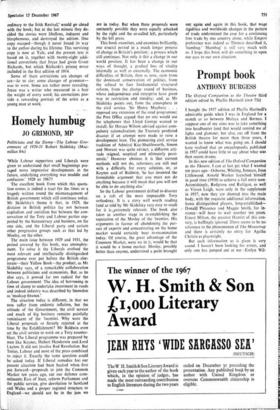g
Homely humbug
JO GRIMOND, MP
'While Labour supporters and Liberals were given to understand that small beginnings pre- saged more impressive developments in the future, underlying everything was muddle and confusion.' 1929 or 1967?
The excellent book from which this quota- tion comes is indeed a tract for the times or a tragedy written round the mismanagement of British government which still continues today. Mr Skidelsky's theme is that, in 1929, the division in British politics lay not between capitalism and socialism but between the con-. servatism of the Tory and Labour parties sup- ported by the bureaucracy and business, on the one side, and the Liberal party and certain other progressive groups such as that led by Mosley, on the other.
The main issue between 1929 and 1931, the period covered by this book, was unemploy- ment. To solve it the Liberals evolved the most relevant and intellectually distinguished programme ever put before the British. elec- torate—their Yellow Book—the product, as Mr Skidelsky says, of a remarkable collaboration between politicians and economists. But, as he also says, it proved far too radical for the Labour government. The idea of borrowing in time of slump to undertake investment in roads and indeed industry was described by Snowdon as 'madcap finance.'
The situation today is different, in that we now suffer from endemic inflation, but the attitude of the Government, the civil service and much of big business remains painfully reminiscent of the 'twenties. Why were the Liberal proposals so fiercely rejected at the time by the Establishment? Mr Baldwin . even set the civil service to work on a Tory counter- blast. The Liberal programme was prepared by men like Keynes, Hubert Henderson andkord Layton. It did not involve Red Revolution. But Tories, Labour and most of the press combined to reject it. Exactly the same question .could be' -asked today. If Liberal remedies foci our present situation had been backed when first put forward—proposals to join the Common Market ten years ago, cut our defence com- mitments East of Suez, reform Parliament and the public service, give devolution to Scotland and. Wales and a proper regional structure to England—we should not be in the jam we
are in today. But when these proposals were eminently possible they were equally attacked by the right and the so-called left, particularly by the left press.
This book examines, and examines brilliantly, one crucial period in a much longer process of change in Britain's position : a process which still continues. Not only is this a change in our world position. It has been a change in our ways of thought, a gradual loss of vitality internally as well as externally. The economic difficulties of Britain, then as now, stem from the dominant conservatism of politics, from the refusal to face fundamental structural reform, from the change round of business, where independence and enterprise have given way to restriction and timidity; and, as Mr Skidelsky points out, from the atmosphere in the civil service. 'Sir Henry Maybury . . . opposed any extension of the road programme; the Post Office argued that no one would use the telephones that Lloyd George wanted to install; Sir Horace Wilson advised against com- pulsory rationalisation; the Treasury predicted disaster if an attempt were made to raise a development loan. The pioneering civil service tradition of Admiral Kay-Shuttleworth, Simon and Morant was quite extinct; a different atti- tude reigned, sceptical and ultimately pessi- mistic.' However obvious it is :that current methods will not do, reformers.„are still met with a difficulty for every solution, or, as Keynes said of Baldwin, 'he has invented the formidable argument that you 'must not do anything because it will mean that you will not be able to do anything else.'
So the Labour government drifted to-disaster on a raft of the most impeccable Tory orthodoxy. It is a story well worth reading (and as told by Mr Skidelsky very easy to read) for it is ;extremely relevant. The book also takes us another stage in re-establishing the reputation of the Mosley of the 'twenties. His arguments in favour of abandoning the pur- suit of exports and concentrating on the home market would certainly bear re-examination today. Of course, the great advantage of the Common Market, were we in it, would be that it would be a home market. Mosley, possibly better than anyone, understood a point brought out again and again in this book, that wage rigidities and worldwide changes in the pattern of trade undermined the case for a continuing free trade by one country alone, while Empire preference was indeed as Thomas described it, 'humbug.' Humbug' is still very much with us. I hope this book will do something to open our eyes to our own situation.


































 Previous page
Previous page